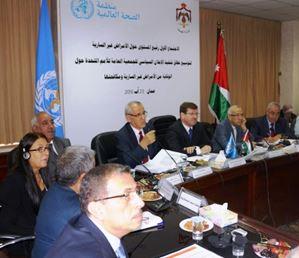 October 2016 – In collaboration with WHO, the first high-level policy meeting to scale up implementation of the United Nations Political Declaration on Prevention and control of Non-Communicable Diseases was held at the Ministry of Health of Jordan, under the patronage of H.E Minister of Health Professor Dr Mahmoud Al-Sheyyab.
October 2016 – In collaboration with WHO, the first high-level policy meeting to scale up implementation of the United Nations Political Declaration on Prevention and control of Non-Communicable Diseases was held at the Ministry of Health of Jordan, under the patronage of H.E Minister of Health Professor Dr Mahmoud Al-Sheyyab.
The meeting aimed to build on the Political Declaration which Jordan has endorsed and took stock of recent developments and ongoing work and commitments at national, global and regional levels, including the efforts of the global NCD Alliance to scale up implementation of prevention and control of noncommunicable diseases. Noncommunicable diseases are estimated to account for 76% of all deaths in Jordan.
In May 2015, the World Health Assembly approved the Director-General’s technical note to adopt and report on 10 progress indicators for the prevention and control of noncommunicable diseases, across all WHO regions. The regional framework for action, which originally incorporated 17 process indicators, was revised accordingly and circulated during the 62nd session of the Regional Committee in October 2015. The yearly country tracking sheets were also revised to reflect the 10 indicators. By unifying the process of reporting across all WHO regions, it has become easier for Member States to report on their progress in implementing the Political Declaration and the four time-bound commitments in a standardized manner.
Three milestones exist for achieving key commitments:
- 2018 – for the four time-bound commitments.
- 2025 – for the nine voluntary global targets.
- 2030 – for reducing deaths from noncommunicable diseases by 30%.
WHO's Regional Director for the Eastern Mediterranean Dr Alaa Alwan talked about disease trends in the Region and highlighted the increase in risk factors and uneven action towards addressing the increase in rates of noncommunicable diseases. He said that this was having a serious socioeconomic impact and health systems were already weakened in many countries. Commitment had not always been translated into sustainable and effective action.
Dr Alwan added that a WHO package of low-cost "best buy" solutions existed but that implementation in countries throughout the Region was still weak. These solutions addressed tobacco use, harmful use of alcohol, unhealthy diet and physical inactivity.
Related links
Regional framework for action | French | Arabic (updated October 2015)
WHO tools to prevent and control noncommunicable diseases
Factsheet on noncommunicable diseases
Read more about noncommunicable diseases and mental health


